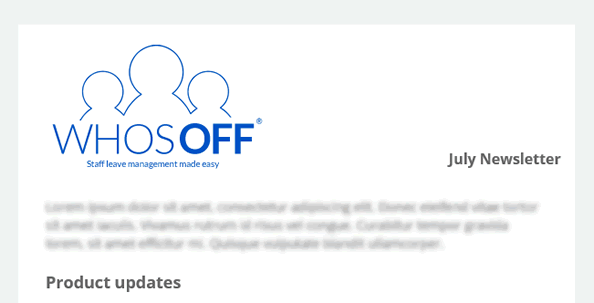Festive lights and carol singing might seem a fair way off, but September is the ideal time for organisations to start thinking about the Christmas holidays. An influx of annual leave requests can affect how well your business runs during this critical period – so the sooner you start planning ahead, the better.
Recent number crunching by WhosOff found that December is the most popular month for staff to request time off, which can pressurise resources during an already busy time of year. Absences can be particularly difficult to manage within SMEs, with over half (53%) of small business owners working on Christmas Day just to keep the company cogs turning.
In an ideal world, most bosses would like to gift staff their ideal working hours over the festive period, without compromising operational productivity. To achieve this, here are some things you should start considering now.
Setting clear policies
Every organisation has a different attitude to festive leave. Some businesses offer staff additional days off to cover the Christmas to New Year period; others will completely shut down. In contrast, some companies require employees to use their annual holiday entitlement if they wish to take time off, while certain sectors – such as retail and hospitality – will still need all hands on-deck.
Whatever your approach, make sure you set clear policies, and share them with staff – including how far in advance any holiday requests must be submitted. This will limit confusion around what type of leave (and how much) people are entitled to over the festive period.
Reminding your workforce of Christmas leave guidelines in September is a really effective way to make sure everyone knows where they stand. It also cuts the admin burden placed on managers or HR personnel, who are often bombarded by the same questions time and time again.
Clearly communicating carryover
Many companies run holiday years alongside the calendar year, and personnel can only roll a handful of unused days over to their next entitlement – if they are allowed to take any forward at all. Failing to make this clear until the eleventh hour can lead to a confusing and chaotic stampede for Christmas leave.
By reiterating your policy around carrying over leave in September, your organisation will give staff the opportunity to manage their remaining allowance effectively. If you don’t permit them to roll days into next year, issuing an early warning ensures that they still have three months to use up their entitlement – rather than flooding the system with last-minute requests in December, when they suddenly realise they are about to lose any days that they still have left to take.

Planning cover in every team
One of the biggest challenges that companies face over the festive period is making sure there is adequate cover across the business. Approving Christmas leave requests is not just a numbers game; there needs to be the right distribution of skills and seniority to keep everything functioning as usual, despite lower staffing levels.
September is the ideal time to work out exactly how many people you need in the office for each day or shift between Christmas and New Year, and how many people from each team or managerial level are required to keep things ticking over. You can then issue every department with clear guidelines for festive cover, and they can agree internally what leave to take, in order to minimise disruption.
Streamline peak holiday planning with leave management technology
Clarity is critical to workload planning at any time of year, and during a peak holiday period like Christmas, it becomes even more important. The earlier your business starts preparing for the festive season, the easier you will find managing operations – especially if you find the tools to simplify the leave request process.
Investing in online leave management software is a really effective way to take the hard work out of co-ordinating the holiday calendar. Tools like WhosOff centralise staff absences in one online platform, which everybody in your company can access to see who is in, and who’s off.
Moving to an online system makes the leave management process much more straightforward, as employees can check whether colleagues have booked holiday before they request time off. Managers and HR staff are automatically notified by email when requests are logged, and they can also check the central database to make sure there are no conflicts of interest.
By increasing transparency across your business, you can ensure that staff understand who is needed to keep your company running efficiently over the Christmas period. And team members can work together to make sure they get the days off they desire, without productivity suffering as a result.
It’s not too late to bring online leave management software on board in time for Christmas. Take a free WhosOff trial to see how our platform works.
Photo by Torsten Dettlaff of Pexels.com

